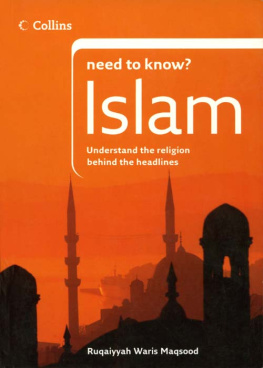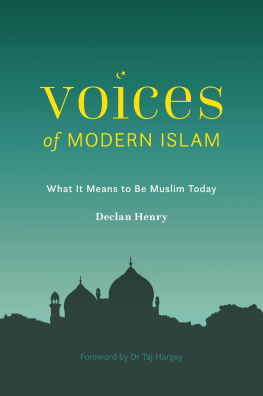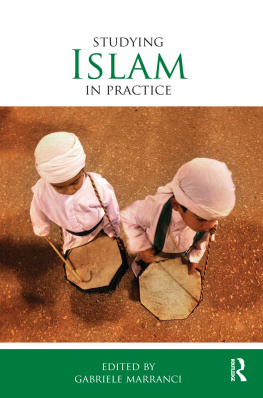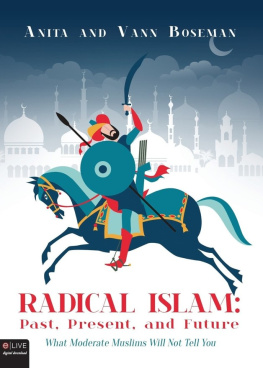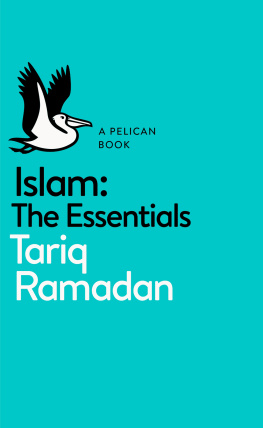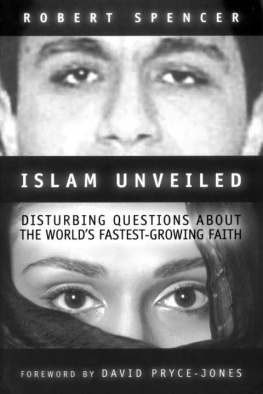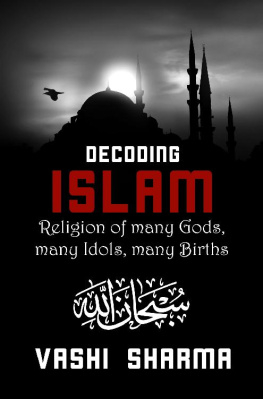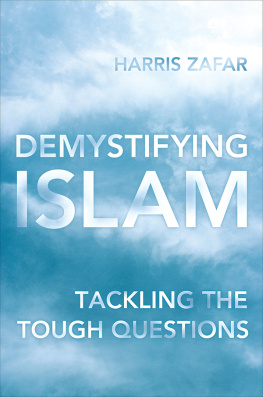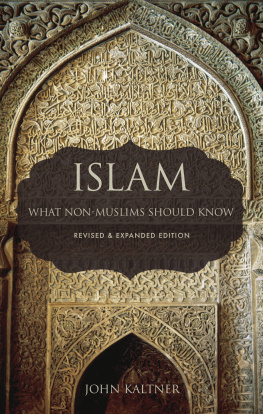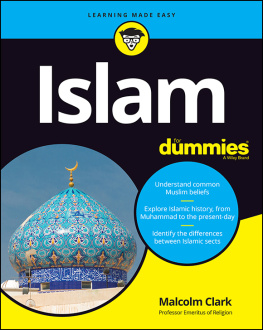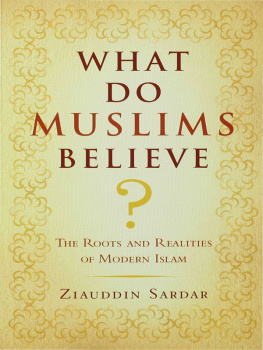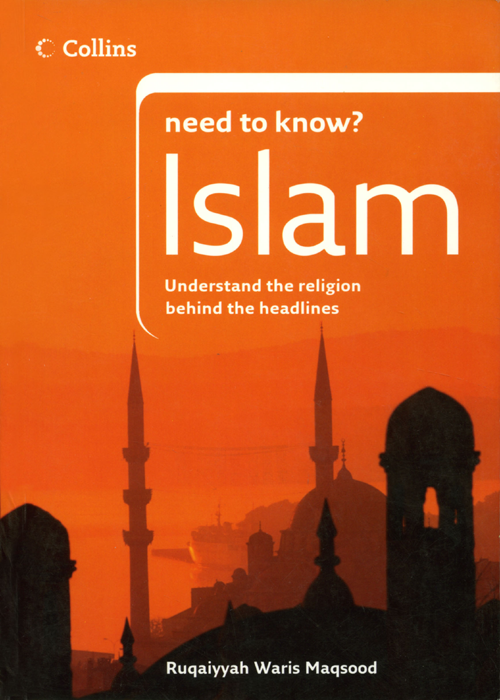Islam is the faith or belief that there is a God, and that He chose the Arab merchant Muhammad b. Abdullah of the Banu Quraysh (570632 CE) to be His Messenger.
The word Muslims use for God is Allah which is not so much a name as a description of a quality of Being; it means the Absolute, the Almighty, the Supreme.
When Muhammad was 40 years old, a visionary experience of the angel Jibril (Gabriel) called him to be Gods messenger. From that moment on his life was not his own, his privacy sacrificed so that everything he said and did could set the pattern for others and show them how they should live.
For the next 23 years his family and companions bore witness to the constant stream of communications brought to him from the Unseen, messages dealing with every aspect of life from important matters to intimate and seemingly trivial details. He memorized each revelation, sometimes lengthy passages, sometimes just a few words, and dictated everything to others once the visitation had ceased.
From rejection, ridicule and persecution in his own town, he became the King of Madinah, and by the end of his life had unified the whole of Arabia under one rule. He was one of the most famous people on earth, receiving visitors and tributes from all over the known world. He was probably the most loved and meticulously observed ruler and religious guide of history.
The way of life he followed is indicated by the word islam which means to submit. Those who practise Islam are known as Muslims people who have made the commitment to hand over their lives to the disciplined way based on love and obedience to the will of God as revealed in the revelations Muhammad received, the collection known as the Quran. Over the last 14 centuries Islam has fashioned the faith, morality and culture of Muslims all over the world, and it is at present the worlds fastest-growing faith.
The aim of this book is to explain the principles of Islam and to show how Muslims strive to bring God-consciousness (taqwa) into every area of their daily lives, from the important and profound to the mundane and simple tasks; and in this devotion and urge to serve, striving for the greater pleasure of their Lord, they find their own fulfillment and happiness.
Each chapter in this book is underpinned by the words of the Quran and the teachings of Muhammad himself, for they are the basis of Islam.
Note
Some names have variant spellings. The following forms are used in this book:
Muhammad (= Mohammed),
Makkah (= Mecca),
Madinah (= Medina),
Quran (= Koran).
1
The Prophet Muhammad
The Prophet Muhammad was a man specially selected by God to communicate His messages to humanity. For the 23 years of his mission he lived in almost continuous prayer, guided day by day by the presence of the angel Jibril (Gabriel). He was to show Gods will through the way he lived his life, with nobility, honesty, generosity, compassion, justice, humility, tenderness, courage and determination. He lived, loved, fought, suffered, knew joy, sorrow and frustration but after his calling he was forever conscious of divine guidance and the responsibility laid upon him.

Courtyard of the Great Mosque, Damascus, Syria.
This chapter tells the remarkable story of the Prophet, from penniless orphan to ruler of Madinah and all Arabia.
The years of preparation
Arabia in the 7th century CE had a mixed population of Jews, Christians and pagans. Many were expecting the imminent arrival of another messenger from God like Abraham or Moses, the prophets of old, to ratify the previous revelations, set the standard that would determine what was true or false in their beliefs and documents, and declare Gods teaching without ambiguity, so that all people could make an informed choice as to whether to accept and live by Gods will. Arabic sources suggested this messenger would have the name of Ahmad. Muslims believe that this prophet was Muhammad.
For the most part, Arabia consisted of scorched, barren deserts, with regions of fertile oases. The centres of population were on the main trade routes that crossed the territory, linking the great cities and permitting the transportation of goods from China and India to Egypt, Africa and across the Mediterranean Sea.
The fertile crescent to the north of Arabia followed the courses of the great rivers Tigris, Euphrates and Jordan. The western coast of the Mediterranean was the region where Abraham, the patriarch of both Arabs and Jews, had led his people from Ur (near Basra in Iraq) via Haran, where biblical history had been played out, and where Jesus had lived and preached.
Christianity in various forms had spread throughout what had been the Roman Empire, which was ruled from Byzantium (Constantinople, now Istanbul) by the Christian emperor Heraclius. Missionary monks had introduced Christianity all over Arabia, and many tribes had accepted either Christianity or Judaism.
There was no central government in Arabia, but some regions had kings; elsewhere, independent tribal chieftains gained power through wealth, prestige or exploits in battle, and ruled their own peoples. Many led nomadic lives, seeking out vegetation for their livestock, and settlements were defended zealously. Passage through Arabia was dangerous and required covenants, deals and payment of protection money. Without this, travellers were considered fair game, and many ended up in the slave market. Life was precarious, and it was normal for men to have as many wives and children as they could afford. Some women also practised polygamy, and maintained a settled household that entertained a selection of nomadic husbands.
Did you know?
Muslims often prefer to use the neutral dating abbreviation CE (Christian Era) rather than AD (Anno Domini, In the year of Our Lord).
Makkah and the Kabah
The city of Makkah was in barren, waterless territory, but its population had burgeoned because for over 2000 years a very special shrine had been venerated there the Kabah, originally dedicated to the One True God. Abraham had found it in a damaged state and rebuilt it, at Gods command, on the same foundations. However, most Arabians worshipped idols, and over the centuries monotheism at the Kabah had been compromised by a huge collection of cultic objects placed there. Three months of the year were regarded as sacred truce months devoted to the gods, and in the month dedicated to a pilgrimage known as a Hajj, devout pagans came hundreds of miles to visit the Kabah, encircle it and perform sacrifices.
Arabs who clung to the belief in One God were known as hanifs, and longed for the day the Kabah could be restored to its original purity. One of these hanifs was Abdul Muttalib, chief of the Quraysh and Guardian of the Kabah. The Prophet Muhammad, born in c. 570, was his grandson.
Must know
All the quotations from the Prophet given in this book are taken from the hadith collections, the memorized records of things he said and did. Quotations in italics are from the Quran itself (the revealed words of God).
Muhammads early years
Muhammads father, Abdullah, died before he was born, and his mother, Aminah, when he was only six years old. His grandfather took custody of him but died two years later, and it was his uncle Abu Talib, a trader, who raised him to manhood.

